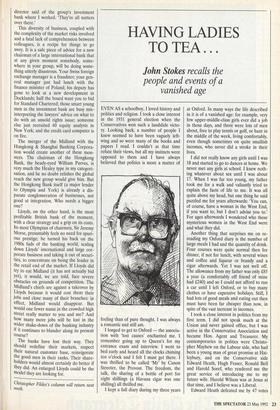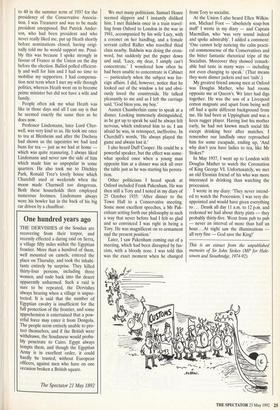HAVING LADIES TO TEA . . .
John Stokes recalls the
people and events of a vanished age
EVEN AS a schoolboy, I loved history and politics and religion. I took a close interest in the 1931 general election when the Conservatives won such a landslide victo- ry. Looking back, a number of people I knew seemed to have been vaguely left- wing and so were many of the books and papers I read. I couldn't at that time refute their views, but all my instincts were opposed to them and I have always believed that politics is more a matter of feeling than of pure thought. I was always a romantic and still am.
I longed to get to Oxford — the associa- tion with 'lost causes' enchanted me. I remember going up to Queen's for my entrance exam and interview. I went to bed early and heard all the clocks chiming ten o'clock and I felt I must get there. I was thrilled to be called 'Mr' by Canon Streeter, the Provost. The freedom, the talk, the sharing of a bottle of port for eight shillings (a Havana cigar was one shilling) all thrilled me.
I kept a full diary during my three years at Oxford. In many ways the life described in it is of a vanished age: for example, very few upper-middle-class girls ever did a job in those days, and there were lots of men about, free to play tennis or golf, or hunt in the middle of the week, living comfortably, even though sometimes on quite smallish incomes, who never did a stroke in their lives.
I did not really know any girls until I was 18 and started to go to dances at home. We never met any girls at school. I knew noth- ing whatever about sex until I was about 17. When I was far too young, my father took me for a walk and valiantly tried to explain the facts of life to me. It was all quite above my head, but one thing he said puzzled me for years afterwards: 'You can, of course, have a woman in the West End, if you want to, but I don't advise you to.' For ages afterwards I wondered who these mysterious women in the West End were and what they did.
Another thing that surprises me on re- reading my Oxford diary is the number of large meals I had and the quantity of drink. Four courses were quite normal then for dinner, if not for lunch, with several wines and coffee and liqueur or brandy and a cigar afterwards. Yet I was not well off. The allowance from my father was only £85 a year (a comfortably off friend of mine had £240) and so I could not afford to run a car until I left Oxford, or to buy many clothes or have expensive holidays. Still, I had lots of good meals and eating out then must have been far cheaper than now, in spite of the vast increase in incomes.
I took a close interest in politics from my first term. I did not speak much at the Union and never gained office, but I was active in the Conservative Association and became Hon. Agent and Treasurer. My contemporaries in politics were Christo- pher Mayhew on the Labour side, who had been a young man of great promise at Hai- leybury, and on the Conservative side Edward Heath, Hugh Fraser, Ronald Bell and Harold Soref, who rendered me the great service of introducing me to my future wife. Harold Wilson was at Jesus at that time, and I believe was a Liberal.
Edward Heath defeated me by 47 votes to 40 in the summer term of 1937 for the presidency of the Conservative Associa- tion. I was Treasurer and was to be made president unopposed. But Patrick Ander- son, who had been president and who never really liked me, put up Heath shortly before nominations closed, having origi- nally told me he would support me. Possi- bly this was because I spoke strongly in favour of Franco at the Union on the day before the election. Balliol polled efficient- ly and well for him and I had no time to mobilise my supporters. I had compensa- tion next term when I met my wife through politics, whereas Heath went on to become prime minister but did not have a wife and family.
People often ask me what Heath was like in those days and all I can say is that he seemed exactly the same then as he does now.
Professor Lindemann, later Lord Cher- well, was very kind to us. He took me once to tea at Blenheim and after the Duchess had shown us the tapestries we had iced buns for tea — just as we had at home which was quite reassuring. I always liked Lindemann and never saw the side of him which made him so unpopular in some quarters. He also took me to Ditchley Park, Ronald Tree's lovely house which Churchill used at weekends when the moon made Chartwell too dangerous. Both these households then employed numerous footmen. Lindemann always wore his bowler hat in the back of his big car driven by a chauffeur.
We met many politicians. Samuel Hoare seemed slippery and I instantly disliked him. I met Baldwin once in a train travel- ling from Oxford to London in the war in 1941, accompanied by his wife Lucy, with a coronet on her handbag, and a female servant called Ridler who travelled third class nearby. Baldwin was doing the cross- word, but suddenly put the paper down and said, 'Lucy, my dear, I simply can't concentrate.' I wondered how often he had been unable to concentrate in Cabinet — particularly when the subject was for- eign affairs. I did, however, notice that he looked out of the window a lot and obvi- ously loved the countryside. He talked pleasantly to me and as I left the carriage said, 'God bless you, my boy.'
Austen Chamberlain came to speak at a dinner. Looking immensely distinguished, as he got up to speak he said he always felt nervous, which endeared him to us. I am afraid he was, in retrospect, ineffective. In Churchill's words, 'He always played the game and always lost it.'
I also heard Duff Cooper. He could be a powerful speaker, but the effect was some- what spoiled once when a young man opposite him at a dinner was sick all over the table just as he was starting his perora- tion.
Other politicians I heard speak at Oxford included Frank Pakenham. He was then still a Tory and I noted in my diary of 25 October 1935: 'After dinner to the Town Hall to a Conservative meeting. Some most excellent speeches, a Mr Pak- enham setting forth our philosophy in such a way that never before had I felt so glad and so convinced I was right in being a Tory. He was magnificent on re-armament and the present position.' Eater, I saw Pakenham coming out of a meeting, which had been disrupted by fas- cists, with a bloody nose. I was told this was the exact moment when he changed from Tory to socialist.
At the Union I also heard Ellen Wilkin- son, Michael Foot — 'absolutely soap-box stuff' I wrote in my diary — and Captain Macmillan, who 'was very sound indeed and spoke admirably'. I added a comment: 'One cannot help noticing the calm practi- cal commonsense of the Conservatives and the bitter fantastic rhetorical tripe of the Socialists. Moreover they showed remark- able bad taste in many ways — including not even changing to speak.' (That means they wore dinner jackets and not 'tails'.) My greatest friend among men at Oxford was Douglas Mather, who had rooms opposite me at Queen's. We later had digs together. He was the son of a Liverpool cotton magnate and apart from being well off had a quite different background from me. He had been at Uppingham and was a keen rugger player. Having lost his mother early, he had not known much social life except drinking beer after matches. I remember our landlady once reproached him for some escapade, ending up, 'And why don't you have ladies to tea, like Mr Stokes?'
In May 1937, I went up to London with Douglas Mather to watch the Coronation of King George VI. Unfortunately, we met an old Etonian friend of his who was more interested in drinking than watching the procession.
I wrote in my diary: 'They never intend- ed to watch the Procession; I was very dis- appointed and would have given everything to ... Drank all day 11 a.m. to 12 p.m. and reckoned we had about thirty pints — they probably thirty-five. Went from pub to pub — never an interval of more than half an hour... At night saw the illuminations all very fine — God save the King!'
This is an extract from the unpublished memoirs of Sir John Stokes (MP for Hale- sowen and Stourbridge, 1974-92).



































































 Previous page
Previous page